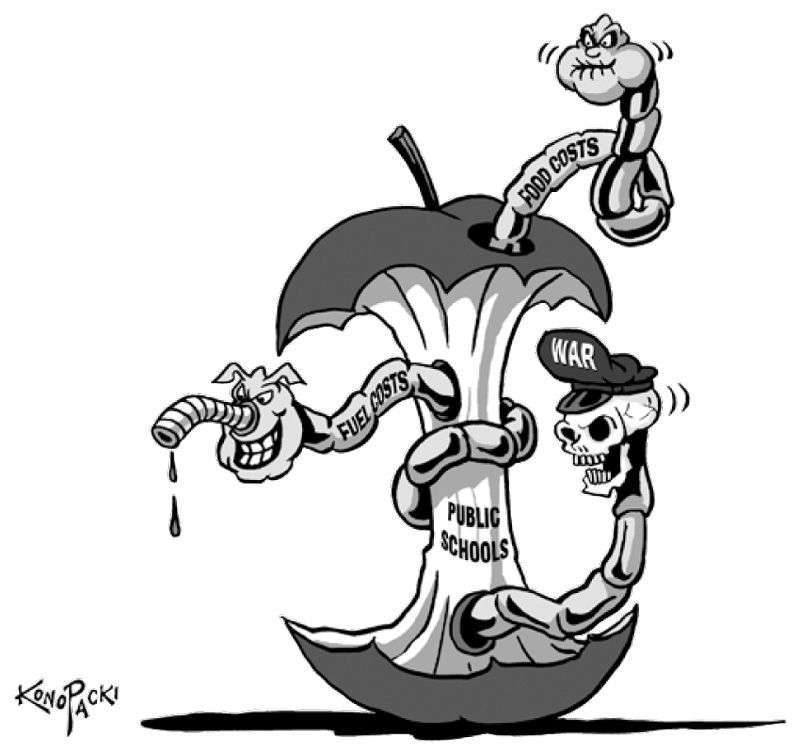Short Stuff 23.1

Bellevue Teachers Flip the Script
Control over classroom curriculum is a critical reason why teachers in Bellevue, Wash., walked off the job for the first time in 30 years. The nine-day walkout ended with the district making concessions on this and other issues.
The teachers ratified a 3-year contract that raises salaries by 5 percent. But, more importantly to teachers, the district “accepted the teachers’ request for flexibility to change daily lesson plans without prior approval,” the Seattle Times reported.
Teachers in the 16,000-student Bellevue School District went on strike on Sept. 2, demanding better compensation and health care benefits. However, teachers were particularly passionate about taming administrators’ control over scripted daily curriculum, sending “curriculum cops” into classrooms — rather than deferring to an educator’s professional discretion.
Students weren’t idle. About 200 of them joined Students for Teachers’ Rights to show solidarity with striking teachers, according to the Socialistworker.org.
Critical Times for Black Males
Compared to their white counterparts, black students, particularly black males, are punished more severely, placed in special education classes more frequently, and are less likely to be found in gifted/talented programs, says a national education foundation.
The Schott Foundation for Public Education report released in late summer cited a number of fear-provoking statistics on the state of black males in public education. For example:
More than half of black males did not receive diplomas with their cohort in 2005-06.
The one million black male students enrolled in the New York, Florida, and Georgia public schools are twice as likely not to graduate with their class as to do so.
Delaware, Georgia, Illinois, Indiana, Michigan, South Carolina, and Wisconsin graduated fewer black males with their peer group than the national average.
Illinois and Wisconsin have nearly 40-point gaps between how effectively they educate their black and white, non-Hispanic male students.
“These trends, and others cited in Given Half a Chance, are evidence of a school-age population that is substantively denied an opportunity to learn, and of a nation at risk,” the editors wrote in the summary to Given Half a Chance: The Schott 50 State Report on Public Education and Black Males.
The report is available for the public and can be downloaded at www.blackboysreport.org.
France Says ‘Non!’ to Tot TV
In August, France’s High Audiovisual Council banned French channels from marketing TV shows to children under 3.
The ruling requires French cable operators airing foreign channels with programming to babies and toddlers to warn viewers that watching such shows can slow development of children under 3, “even when it involves channels aimed specifically for them.”
The council said that television viewing by children that young poses “a certain number of risks, encouraging passivity, slow language acquisition, over-excitedness, troubles with sleep and concentration as well as dependence on screens.”
The U.S.-based Campaign for a Commercial-Free Childhood applauded the decision and recommended the Federal Trade Commission follow suit.
“It… sends an important message that, in France, the well-being of infants and toddlers is more important than the bottom line of companies… that exploit our youngest and most vulnerable children by falsely claiming to parents that their programming is educational,” said the CCFC’s Susan Linn.
Feds No Help Facing NCLB
While No Child Left Behind offers American Indian tribes a chance to create alternate definitions of yearly progress, a recent report by the Government Accountability Office shows the Interior department hasn’t been of much use to tribes on this issue.
The Department of Interior’s Bureau of Indian Education educates 48,000 students in 23 states, according to the GAO. Fewer than one third of the 174 schools made Adequate Yearly Progress goals under NCLB during the 2006-07 school year.
“The Navajo Nation, the Miccosukee Tribe in Florida, and a tribal consortium in South Dakota, called the Oceti Sakowin Education Consortium, are in the early stages of producing their own culturally relevant academic standards and assessments to be used for accountability under the federal education law,” Education Week reports, adding that tribal leaders expressed their frustration with the BIE during a Congressional hearing in early September.
The GAO says the BIE and tribes got off to a “rocky start,” but an official told a House subcommittee on Education and Labor that things have improved.

